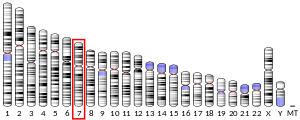PRSS2
Protease, serine, 2 (trypsin 2) is a protein that in humans is encoded by the PRSS2 gene.[5]
Function
This gene encodes a trypsinogen, which is a member of the trypsin family of serine proteases. This enzyme is secreted by the pancreas and cleaved to its active form in the small intestine. It is active on peptide linkages involving the carboxyl group of lysine or arginine. This gene and several other trypsinogen genes are localized to the T cell receptor beta locus on chromosome 7. [provided by RefSeq, Jul 2008].
References
Further reading
- Williams SJ, Gotley DC, Antalis TM (July 2001). "Human trypsinogen in colorectal cancer". International Journal of Cancer. 93 (1): 67–73. doi:10.1002/ijc.1304. PMID 11391623.
- Mayumi T, Inui K, Maetani I, Yokoe M, Sakamoto T, Yoshida M, Ko S, Hirata K, Takada T (August 2012). "Validity of the urinary trypsinogen-2 test in the diagnosis of acute pancreatitis". Pancreas. 41 (6): 869–75. doi:10.1097/MPA.0b013e3182480ab7. PMID 22481290.
- "PRSS1-Related Hereditary Pancreatitis". 1993. PMID 22379635.
- Ahmed M, Forsberg J, Bergsten P (2005). "Protein profiling of human pancreatic islets by two-dimensional gel electrophoresis and mass spectrometry". Journal of Proteome Research. 4 (3): 931–40. doi:10.1021/pr050024a. PMID 15952740.
- Vilen ST, Suojanen J, Salas F, Risteli J, Ylipalosaari M, Itkonen O, Koistinen H, Baumann M, Stenman UH, Sorsa T, Salo T, Nyberg P (October 2012). "Trypsin-2 enhances carcinoma invasion by processing tight junctions and activating ProMT1-MMP". Cancer Investigation. 30 (8): 583–92. doi:10.3109/07357907.2012.716467. PMID 22909050.
- Lempinen M, Isoniemi H, Mäkisalo H, Nordin A, Halme L, Arola J, Höckerstedt K, Stenman UH (November 2007). "Enhanced detection of cholangiocarcinoma with serum trypsinogen-2 in patients with severe bile duct strictures". Journal of Hepatology. 47 (5): 677–83. doi:10.1016/j.jhep.2007.05.017. PMID 17640760.
- Galey D, Becker K, Haughey N, Kalehua A, Taub D, Woodward J, Mattson MP, Nath A (June 2003). "Differential transcriptional regulation by human immunodeficiency virus type 1 and gp120 in human astrocytes". Journal of Neurovirology. 9 (3): 358–71. doi:10.1080/13550280390201119. PMID 12775419.
- Baptista AM, Jonson PH, Hough E, Petersen SB (September 1998). "The origin of trypsin: evidence for multiple gene duplications in trypsins". Journal of Molecular Evolution. 47 (3): 353–62. doi:10.1007/PL00006393. PMID 9732462.
- Gao J, Zhu F, Lv S, Li Z, Ling Z, Gong Y, Jie C, Ma L (June 2010). "Identification of pancreatic juice proteins as biomarkers of pancreatic cancer". Oncology Reports. 23 (6): 1683–92. doi:10.3892/or_00000812. PMID 20428826.
This article incorporates text from the United States National Library of Medicine, which is in the public domain.
This article is issued from
Wikipedia.
The text is licensed under Creative Commons - Attribution - Sharealike.
Additional terms may apply for the media files.



